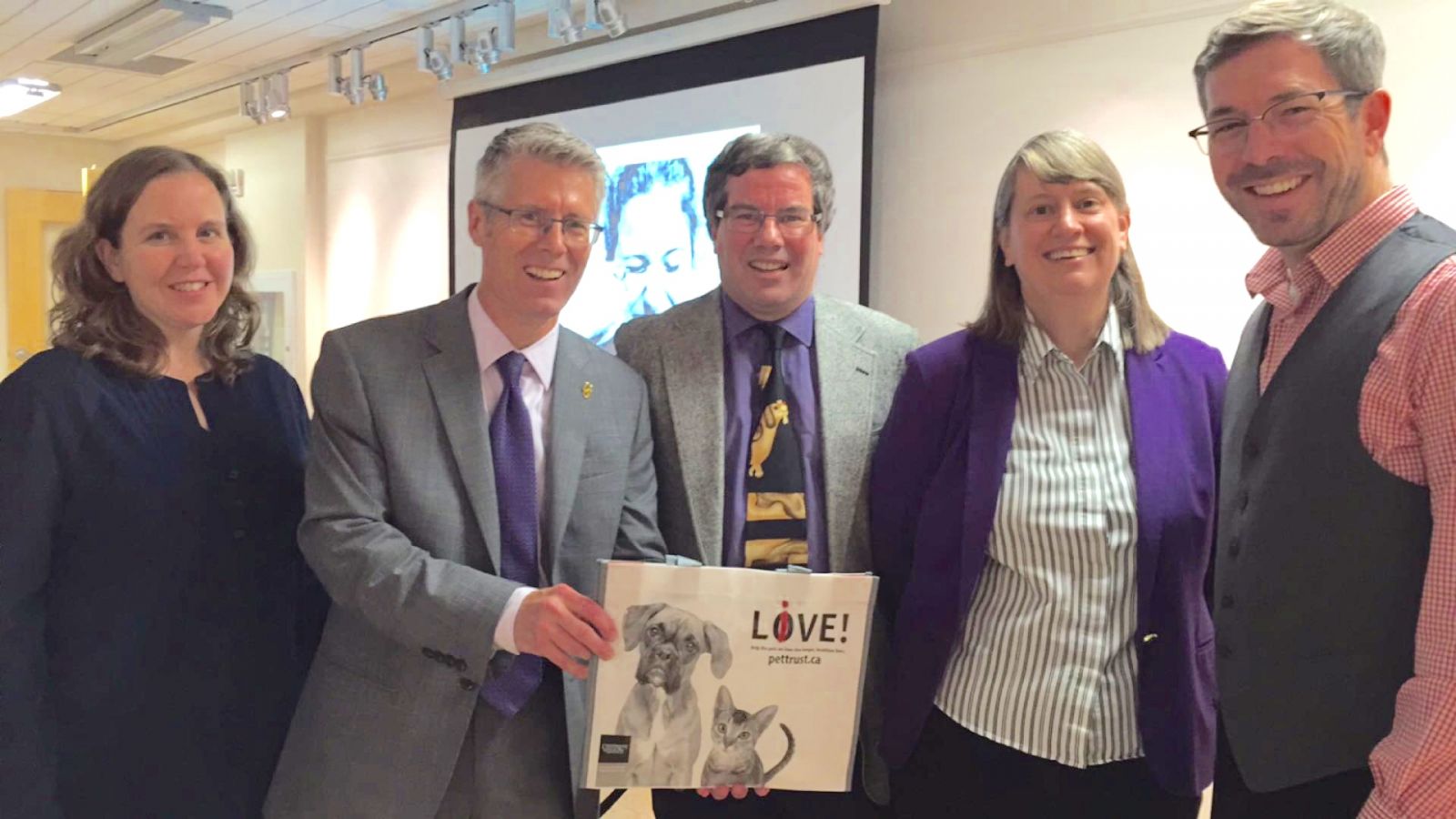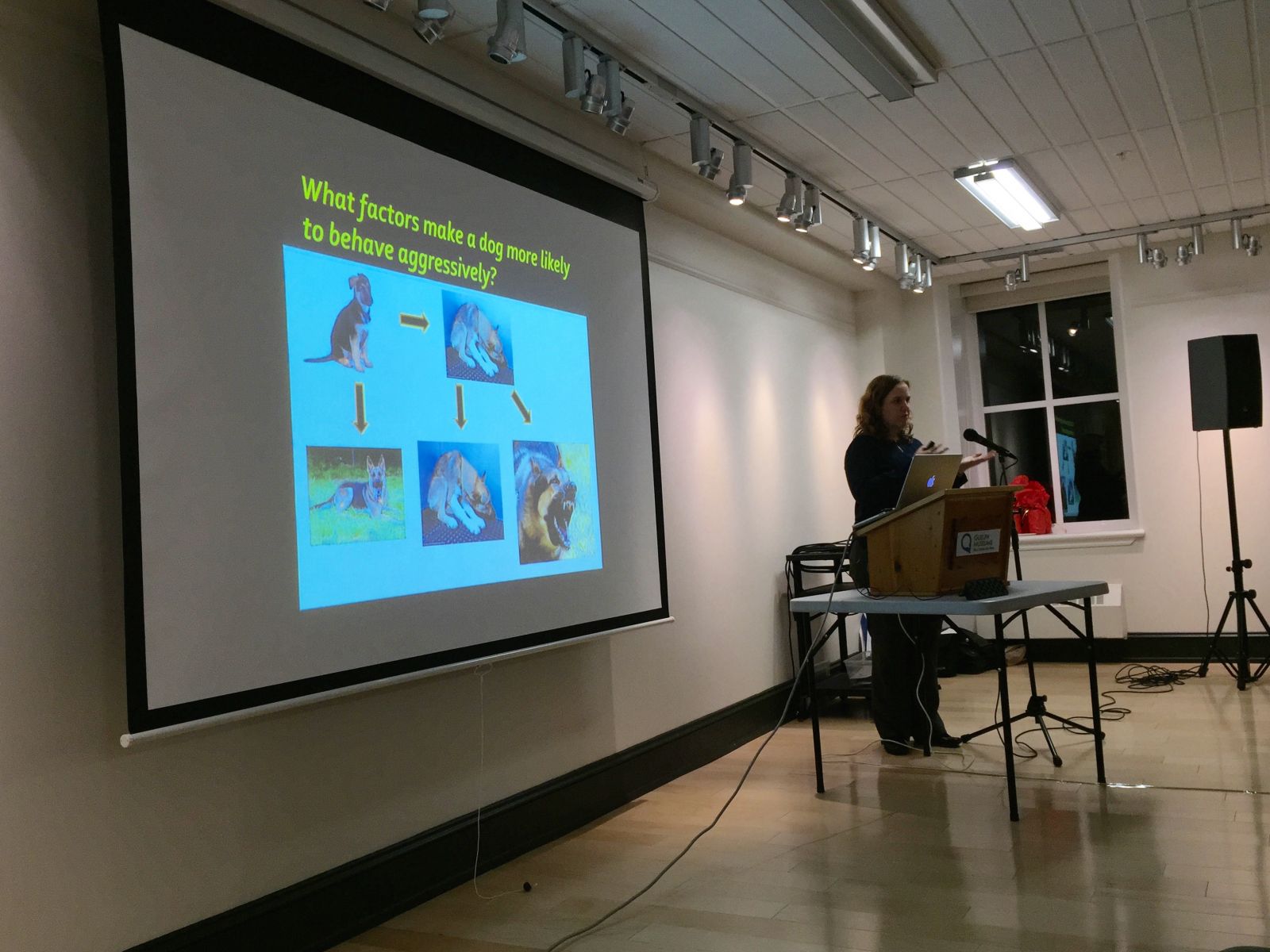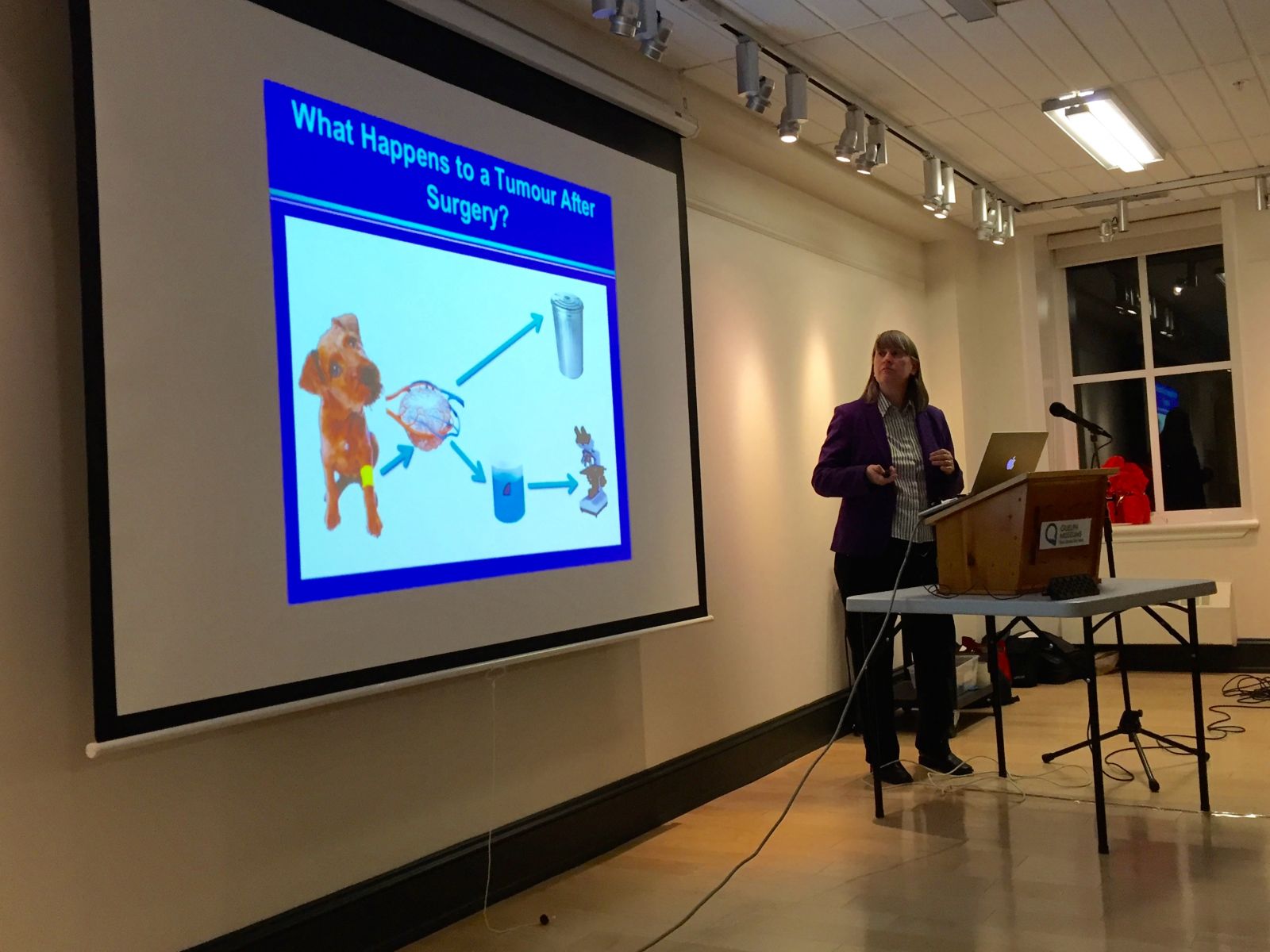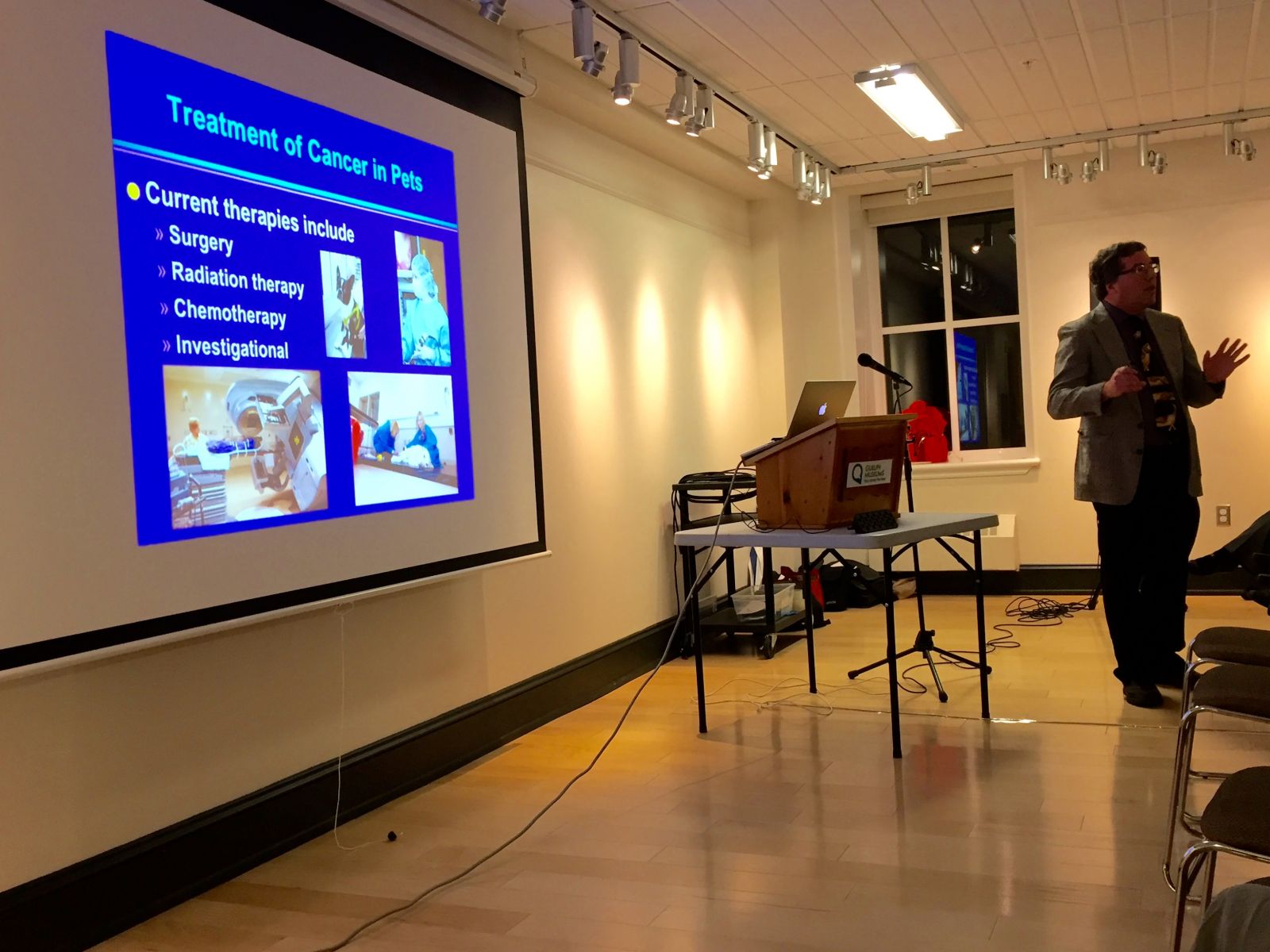Connecting the Community with Science: “From the laboratory… to the Labrador”
DID YOU KNOW? ... Almost 8 million Canadian households share their homes with companion animals?
Four Ontario Veterinary College (OVC) researchers spoke at a community panel event held at the Guelph Civic Museum on October 20. The evening was part of the Research Matters event series, organized by the Office of Research at the University of Guelph. The event’s purpose was to showcase and promote research happening on-campus with Guelph residents, and was moderated by Dr. Malcolm Campbell, Vice-President of Research at the University of Guelph.
Do you ever wonder what kinds of practical uses come from academic research at a university? Why, exactly, does research matter?
The researchers shared details of their studies at the OVC, the impact and importance their work encompasses and how it benefits our furry friends. An engaged audience of more than 50 members of the community listened to the discussion, and had the opportunity to ask their own questions following the researchers’ presentations.
Campbell articulated the importance of the relationship between scientific research and the community:
"Research is propelled to incredibly great heights when it involves community. In the past, it was largely a community of fellow researchers that powered discovery. Today, we have come to value the involvement of society at large in research. Companion animal research is a perfect example of the phenomenal strength provided by community involvement. When homes with companion animals participate in research, it fuels the entire process with data - the currency of discovery. As such, community engagement in companion animal research is driving discoveries that promote the well-being of the animals with which we share our lives, and is making inroads in our understanding and treatment of human illness as well."

From left to right: Lee Niel, Malcolm Campbell, Paul Woods, Brenda Coomber and Shane Bateman at the Let’s Talk About Pets event.
Do you want to learn more about how research impacts our communities and the pets we love?
To learn more about the important research happening at the OVC that benefits our feline friends and canine companions, we’ve shared our researcher Q&As below. OVC Pet Trust funds more than $600,000 annually to support learning, healthcare and research at the OVC.
.jpg)
Moderator Dr. Malcolm Campbell asks the audience who shares their home with a furry friend at the Let’s Talk About Pets event.
Shane Bateman
Associate Professor, Clinical Studies, Ontario Veterinary College
Why Does [His] Research Matter?
Helping Homeless Cats in Guelph
DID YOU KNOW? ... Estimates suggest the homeless cat population in Guelph could be anywhere from 6,000 to 10,000 with some estimates up to 20,000?
Q: What is the Guelph Cat Population Task Force (GCPTF)?
A: The GCPTF was developed several years ago to address the overpopulation of community (homeless or feral) cats in Guelph, and to facilitate community understanding and decision-making on the issue. The task force is a community collaboration between various stakeholders who work together to implement projects with community support backed by scientific merit. Annually, close to 1,000 cats come through the Guelph Humane Society. It’s very difficult to know how many of these fit into the community cat category; cats that are social are usually adopted. Community cats have surged in recent years in the Guelph area, and my research is largely based on finding a solution to the growing problem.
Q: Why are homeless cats a problem for the communities in which they live, and how has research contributed to solving the problem?
A: Animal welfare agencies across North America have all struggled with cat overpopulation, so it is not something that is unique to the Guelph area. Cats are a different kettle of fish – in comparison to dogs, cats are much more able to make a living and survive on the streets. Sometimes we make cats out to be villainous creatures – homeless cats may exhibit unwanted behaviours and potentially transmit diseases. Songbird predation is an important concern for many citizens. A traditional approach to dealing with homeless cats has been euthanasia, which is now generally recognized as an unethical and ineffective solution. My research involves investigating results from various studies to determine the best chance of success with future initiatives.
Q: What strategies will be effective to address and manage the population?
A: It is recognized that neutering prevents cats from contributing to worsened population dynamics, and also that they are better off in the environment rather than euthanized. The focus has been on developing ethical solutions like reducing euthanasia – we know it doesn’t work. A strategy of ‘Trap, Neuter and Return’ is a popular approach a number of agencies have adopted. However, the strategy of neutering and returning the cat to their environment may not have the end result we are hoping for – stabilized population at a much reduced number – because you are then left to manage the remaining population. We still don’t know what the correct answer will be to get us to the best strategy. Engaging the community and continuing our research to measure the impact of cats on our environment will be key to finding the solution.
.jpg)
Lee Niel
Assistant Professor, Population Medicine, Ontario Veterinary College and Col KL Campbell Chair in Companion Animal Welfare
Why Does [Her] Research Matter?
Preventing Aggression in Dogs
DID YOU KNOW? ... In Canada, 32 per cent of households own 1 or more dogs? Annual dog bite rates in the US are 1.8 per cent of the population, which equals about 4.7 million people. In Canada, it's estimated the number of people bitten annually is 600,000.
Q: Why is aggression in dogs a serious issue?
A: Aggression is a serious problem for both humans and their dogs. Human damage (dog bites) and resulting financial insurance liability claims are a huge component. My interest though is examining animal welfare concerns: breakdown of the human-animal bond, euthanasia, relinquishment to a shelter and abuse and neglect are often results of aggression.
Q: Why do particular dogs become aggressive and how can we prevent it in the first place?
A: It is important to recognize that aggression exists across all different breeds of dogs, including small breeds. No one particular breed is necessarily more problematic, and research suggests animal control strategies such as breed bans (for example, Pitbulls in Ontario) are not effective. My research involves studying why dogs become aggressive, so that we can better understand how to prevent it. One area of interest is the effect of early socialization on dog behavior. Positive experiences with dogs and other species (including humans) between the age of three and 14 weeks is critical for normal development of social behaviour in dogs. Our recent research suggests that early socialization influences behaviors that are likely related to aggression; for example, low socialized dogs tend to be more impulsive. In other research, we are looking at developing tools to help researchers, owners and shelter workers better identify aggressive behaviors in dogs and recognize risk factors for different types of aggression, such as resource-guarding and fear-related aggression. With more research, I hope to be able to help owners identify high-risk dogs before they show aggression, and develop effective strategies for prevention.
Q: What role can dog owners play to help?
A: Owner education is very important; the first step is reducing the risk of problems by being familiar with dog behaviour and using appropriate methods for socializing, training and interacting with dogs. For example, positive interactions with dogs around food - which might include providing them with additional tasty treats, and avoiding taking food items away from them or disturbing them while they are eating - appear to be helpful in reducing aggression. In addition, if people observe their dog behaving in a way that is concerning, they should seek professional advice as soon as possible, because behaviour problems are easier to treat if they are caught early.

Brenda Coomber
Professor, Biomedical Sciences, Ontario Veterinary College and Co-Director, Institute for Comparative Cancer Investigation (ICCI), University of Guelph
Why Does [Her] Research Matter?
Fighting Cancer
DID YOU KNOW? ... The University of Guelph's Institute for Comparative Cancer Investigation (ICCI) was launched in 2007 and is the first of its kind in Canada. The ICCI is dedicated to providing comprehensive cancer care for pets and unlocking the secrets of cancer for all species, including humans.
Q: What is the Mona Campbell Centre for Animal Cancer?
A: The Mona Campbell Centre is the most comprehensive animal cancer research and treatment center in Canada, and the ICCI is based here. We are a comprehensive veterinary cancer center that focuses on diagnosis and treatment, which is fully integrated into the ICCI's cancer research enterprise.
Q: What is the tumor bank?
A: The ICCI Companion Animal Tumor Sample Bank is unique in Canada – we are the only veterinary oncology sample bank in the country, and one of the most comprehensive in North America. We collect, store and study blood and tissue samples from dogs and cats with all types of cancer. To date, we have banked more than 8,000 vials of samples from more than 400 dogs and 40 cats. We are storing samples for use by future researchers to study questions we may not have even thought of yet. In human medicine, personalized oncology treatment means therapy based on genetic changes in the tumor instead of only on the type of cancer. Comparative studies of companion animal tumors is building on that idea.
Q: How would you describe cancer research in layman’s terms?
A: Cancer research is an incremental activity. I prefer the baseball analogy. We [cancer researchers] very rarely hit home-runs; there’s a great deal of bunting, some pop-flies, a lot of outs and sometimes double-plays. And when you’re really lucky, every now and again you get a grand-slam. However, even in playing "little ball", enough incremental advances in the correct sequence, can win the World Series. Cancer is an extremely complicated disease; it is a puzzle, and it consists of putting together information learned in various studies. That takes time, as well as an integrated and collaborative approach – at the ICCI, this is our strength. We can investigate ideas, make inferences through collaboration and explore different ways of thinking about the disease through integrative work across the University of Guelph campus, across the country and around the world.

Paul Woods
Professor, Internal Medicine and Oncology, Clinical Studies, Ontario Veterinary College and Co-Director, Institute for Comparative Cancer Investigation (ICCI), University of Guelph
Why Does [His] Research Matter?
Fighting Cancer: How Studying Animal Cancer Can Benefit Human Cancer Patients
DID YOU KNOW? ... The Mona Campbell Centre for Animal Cancer at the OVC treats 100 to 120 pets each week? The top three most common cancers in dogs are lymphoma, osteosarcoma (the bone cancer Terry Fox had) and mast cell tumour.
Q: What are the main causes of animal cancers?
A: Similar to people the causes may include environment, diet, hormones, radiation, viruses, genetics and trauma.
Q: How do you treat animal cancers?
A: Cancer treatment in companion animals is very similar to how human cancer is treated. At the Mona Campbell Centre, 15 per cent of our patients are new, and being referred from their primary care veterinarians for further diagnostics or therapy. Eighty-five per cent are returning patients for treatment. Therapies include surgery, radiation therapy, chemotherapy, and investigational therapy. Quality of life, including pain management, is always the priority throughout therapy.
Q: What about clinical trials?
A: Because our approach to animal cancer treatment is very similar to that of a human cancer hospital, we are in a position to be able to conduct clinical trials with animals in the hopes that the findings will translate into benefits for our pets, and in some cases also for human cancer treatment as well. These clinical trials are reviewed and regulated, but it is less costly and faster to run an investigational treatment with a dog versus conducting a human clinical trial. The connection is that animals and humans experience many of the same types of cancers. If a treatment works well in dogs, then maybe it will work well in people too. We have a Clinical Research Coordinator who recruits patients, explains studies, obtains informed consent from the family and ensures protocols are followed and high-quality samples are collected. At present, more than 540 dogs and cats have participated in clinical studies at the Mona Campbell Centre at the OVC. The connection between research and healthcare is absolutely essential. We study cancer in pets and take our new knowledge gained from the laboratory to help the Labrador Retriever (and other breeds)!

Want to learn more?
Listen to a podcast of a Q&A with the researchers. Thanks to our friends at the Office of Research for organizing an informative event and to our OVC researchers for sharing why research matters.
Get Social!
Connect with OVC Pet Trust on Facebook and Twitter @OVCPetTrust

